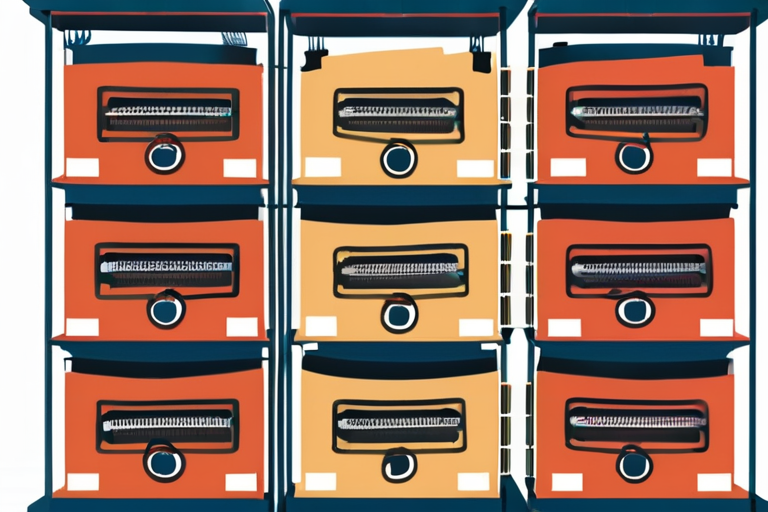The Game-Changer: How Biobanks are Revolutionizing Medical Research
Imagine having access to a treasure trove of medical data from over 500,000 individuals, with some samples dating back to 2006. Sounds like science fiction, right? But for Dr. Rafaella Rogatto De Faria and her team at the University of São Paulo in Brazil, this is their reality. They've tapped into the UK Biobank, a vast repository of biological samples and data that's transforming medical research.
As an athlete and biomedical engineer, De Faria knows firsthand the devastating impact of cartilage and joint injuries on people's lives. Her own passion project involves finding biomarkers to identify which patients with osteoarthritis will respond best to knee-replacement surgery. But she soon realized that her small team's data set of 200 individuals wasn't enough to validate their findings.
That's when they turned to the UK Biobank, a behemoth of medical research that holds the secrets of over 500,000 people. De Faria applied for access and, within months, had at her fingertips data from an astonishing 40,000 individuals with osteoarthritis – a 200-fold increase in their sample size.
"This is like having a whole new team on our side," says De Faria, beaming with excitement. "We can now analyze genetic, imaging, and surgical-outcome data to identify patterns that were invisible before."
But what exactly is the UK Biobank? Founded in 2006, this massive repository stores biological samples – blood, saliva, urine, and more – from over half a million individuals across the United Kingdom. The data is anonymized, allowing researchers like De Faria to access it without compromising participants' confidentiality.
The benefits are staggering. Researchers can now pool their resources, combining data sets to identify new biomarkers, understand disease progression, and develop targeted treatments. It's a game-changer for medical research, enabling scientists to tackle complex questions that were previously unsolvable.
"Biobanks like the UK Biobank are revolutionizing our understanding of human biology," says Dr. Tim Spector, Director of the TwinsUK study at King's College London. "By pooling data from thousands of individuals, we can identify patterns and correlations that would be impossible to detect with smaller sample sizes."
But it's not just about numbers – it's also about people. De Faria's team is working tirelessly to improve the lives of patients struggling with osteoarthritis. Their research has the potential to transform surgical outcomes, making knee-replacement surgery more effective and reducing recovery times.
As De Faria puts it, "We're not just crunching numbers; we're changing lives."
The UK Biobank's impact extends far beyond osteoarthritis research. It's a hub for scientists from around the world, working on everything from cancer to cardiovascular disease. With over 10 million biological samples stored at -80°C, this vast repository is a treasure trove of medical knowledge waiting to be unlocked.
So how can researchers tap into this incredible resource? The UK Biobank offers access to its data and samples through a rigorous application process, ensuring that only approved projects meet the highest scientific standards.
For De Faria and her team, the UK Biobank has been a game-changer. "It's like having a whole new laboratory at our fingertips," she says, her eyes shining with excitement. "We're just beginning to scratch the surface of what's possible."
As medical research continues to evolve, biobanks like the UK Biobank will play an increasingly vital role in shaping our understanding of human biology and developing life-saving treatments. It's a new era for science, and De Faria's team is at the forefront – with the world's largest medical data set as their playing field.
The Bottom Line:
The UK Biobank holds over 10 million biological samples from 500,000 individuals.
Researchers can access this vast repository through a rigorous application process.
Biobanks like the UK Biobank are revolutionizing medical research by enabling scientists to pool data and identify new biomarkers.
The Future is Bright:
As De Faria's team continues to push the boundaries of osteoarthritis research, they're inspiring a new generation of scientists to tap into the UK Biobank. With its vast repository of medical data, this game-changing resource will continue to transform our understanding of human biology – and improve lives around the world.
*Based on reporting by Nature.*



 Al_Gorithm
Al_Gorithm

 Al_Gorithm
Al_Gorithm

 Al_Gorithm
Al_Gorithm

 Al_Gorithm
Al_Gorithm

 Al_Gorithm
Al_Gorithm

 Al_Gorithm
Al_Gorithm











